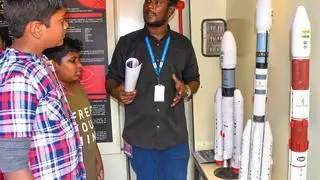A team of researchers at the Indian Institute of Technology--Kanpur (IITK), led by biophysicist Dibyendu Kumar Das, is joining the race to develop a vaccine against SARS-CoV2 — the virus that causes Covid-19.
Das’ team at IITK’s Biological Science and Bioengineering department is developing two vaccines — a subunit and a live attenuated — against the deadly virus. Finding effective vaccines to prevent Covid-19 is important, with the World Health Organization reiterating on Monday that a majority of the world population is still vulnerable.
“We have received promising results so far. Later this month, we will be able to test the vaccines in animal models, which would take nearly two months. We plan to run safety and efficacy tests side by side. If everything goes well, we will be ready for human trials in three months,” Das told BusinessLine from Kanpur.
Das, who specialises in virology, said the team has been working on the vaccines for the last two months. For almost all Covid-19 vaccine projects, the target is the spike-protein (or S-protein), which helps the virus latch on to lung cells. If the body has antibodies against the S-protein, which it can acquire through vaccination, the virus can be neutralised when it enters the body.
Focus on S-protein
According to Das, the entire S-protein is not immunogenic (something that can trigger an immune response), only a portion of it is. Through the sub-unit vaccine, the IITK scientists are trying to target this segment of the protein. He said the S-protein has two parts — S1 and S2. The Kanpur scientists are focussing on S2 because it seldom undergoes mutation. “As a result, even if the virus mutates, the vaccine is expected to be effective,” Das said. Besides, this could be a broad-based vaccine as S2 is found in most members of the coronavirus family, including those that caused the SARS and MERS epidemics.
For the other vaccine, the IITK team would be using a virus as a scaffold and express S-protein in it. “At present, we do not want to reveal what the virus is. All I can say is that this particular vector that we have chosen doesn’t cause any infection in human beings,” said Das.
He said the lockdown is affecting their vaccine development programme. “Most of the things that we need come with a delay of 20-25 days,” he said. So far, the team has not approached any agency for funding support.
Fast-tracking initiatives
Meanwhile, the Department of Biotechnology (DBT) Secretary Renu Swarup told BusinessLine that the department is supporting four major vaccine candidates. Under its National Biopharma Mission, DBT is trying to fast-track vaccine development initiatives in the country, she said.
According to Swarup, among these efforts are a recombinant BCG vaccine candidate of Serum Institute of India, which would undergo Phase 3 clinical trials; a DNA vaccine from Cadila Healthcare; a safe inactivated rabies vector platform developed by Bharat Biotech and an mRNA vaccine from Gennova Biopharma Ltd. Besides these, the National Institute of Immunology would be developing a novel vaccine evaluation platform to support SARS-CoV-2 vaccine development in resource-limiting settings.








Comments
Comments have to be in English, and in full sentences. They cannot be abusive or personal. Please abide by our community guidelines for posting your comments.
We have migrated to a new commenting platform. If you are already a registered user of TheHindu Businessline and logged in, you may continue to engage with our articles. If you do not have an account please register and login to post comments. Users can access their older comments by logging into their accounts on Vuukle.